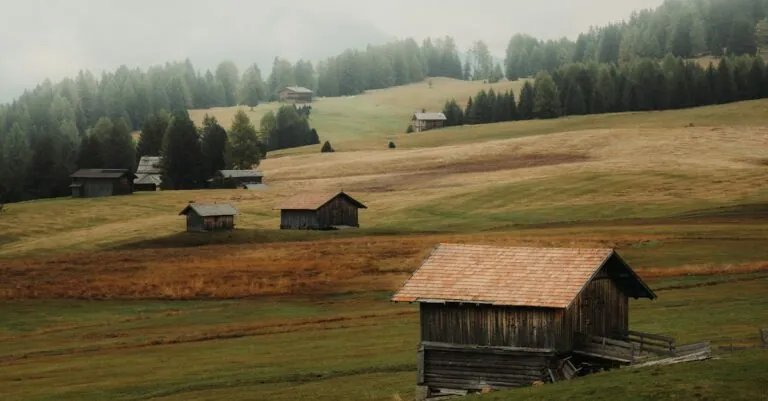Imagine sitting around the campfire, roasting marshmallows, and reminiscing about the day’s adventures. But wait! What if those memories could be captured in a journal? Camp journal prompts are the secret sauce to transforming fleeting moments into lasting treasures. They spark creativity and help campers reflect on their experiences, making every trip unforgettable.
Table of Contents
ToggleOverview of Camp Journal Prompts
Camp journal prompts serve as valuable tools for enriching the camping experience. They help campers articulate feelings and thoughts, ensuring memories stay vivid. Using these prompts, individuals can explore various themes, such as nature observations, personal reflections, and interactions with fellow campers.
Prompts encourage self-expression. Campers can document their daily activities, highlight memorable moments, and reflect on personal growth. Engaging with journal prompts fosters a deeper connection to the camping environment while nurturing creativity.
For example, a prompt like “Describe your favorite campfire memory” invites campers to recount experiences and emotions tied to that event. Another prompt, “What did you learn from a new friend at camp?” promotes reflection on interpersonal relationships and shared experiences.
Camp journal prompts also enhance mindfulness. By focusing on specific moments, campers practice gratitude and appreciation for their surroundings. This focus encourages individuals to notice details they might otherwise overlook.
Utilizing a range of prompts keeps the journaling experience fresh and engaging. Campers can vary their writing style, experimenting with poetry, narrative, or lists. Different formats allow for creative freedom and adaptability, making journaling enjoyable.
Overall, camp journal prompts transform fleeting experiences into enduring narratives. They provide a structured yet flexible approach to documenting adventures, ensuring the camping journey leaves a lasting impression on each camper.
Benefits of Using Camp Journal Prompts
Camp journal prompts enhance the camping experience in multiple ways. They support personal growth and emotional processing, making the journey memorable.
Encouraging Self-Reflection
Self-reflection occurs as campers engage with journal prompts. Questions such as “What has been your biggest challenge at camp?” invite deeper introspection. Campers gain insights into their feelings and motivations through thoughtful responses. Writing about experiences fosters an awareness of personal growth. Reflecting on relationships and interactions strengthens connections with others. Memories gain significance as campers articulate thoughts and emotions on paper. This practice builds self-awareness, helping individuals better understand their changes throughout the camping experience.
Fostering Creativity
Creativity flourishes when campers use journal prompts. Unique questions like “Invent a campfire story featuring a mythical creature” inspire imaginative thinking. Campers can explore their artistic sides through writing and illustrating their thoughts. Engaging with diverse prompts encourages experimentation with various writing styles. Such activities stimulate problem-solving skills and innovative ideas. Creativity helps create vivid descriptions of their surroundings and adventures. Campers often discover new perspectives and insights through this imaginative process. By embracing creativity, they enhance the overall meaning of their camping experiences.
Types of Camp Journal Prompts
Camp journal prompts can be categorized into various types, each serving a unique purpose in enhancing the camping experience. These prompts guide reflection and creativity, allowing campers to capture their adventures in distinct ways.
Nature-Inspired Prompts
Nature-inspired prompts focus on the environment and the outdoor experience. Questions like “What sounds do you hear in the forest?” encourage campers to observe their surroundings. Observing wildlife, plants, and landscapes enriches their connection to nature. “Describe the colors of the sunset you witnessed” helps campers articulate the beauty of their environment. Other prompts might include “What animal would you like to see at camp?” or “How does the weather affect your mood?” These questions inspire mindfulness and appreciation for the natural world, enhancing the overall camping experience.
Adventure and Exploration Prompts
Adventure and exploration prompts invite campers to share their experiences with activities and discoveries. “What was your favorite hike and why?” gives insight into personal experiences while promoting detail-oriented writing. Describing new challenges, such as “What was something you tried for the first time at camp?” encourages campers to embrace their sense of adventure. Additional prompts like “What hidden spots did you discover while exploring?” invite deeper exploration of the campgrounds. These reflections help campers develop a sense of adventure and self-awareness as they recount the excitement of their experiences.
Friendship and Connection Prompts
Friendship and connection prompts foster social bonds among campers. Asking “What’s a fun memory you made with a friend?” inspires reflections on shared experiences that strengthen relationships. Campers can explore feelings about friendship by responding to prompts like “How did you resolve a conflict with a friend?” Each prompt encourages campers to articulate their thoughts and emotions. Additional questions, such as “What do you admire most in your camp friends?” cultivate appreciation for their peers. Reflecting on friendships enhances campers’ social skills and emotional intelligence, making their time at camp more memorable.
Tips for Effective Journaling
Creating an effective journal involves a few key strategies that enhance reflection and creativity. Utilizing the following tips can significantly improve the journaling experience.
Setting the Right Environment
Establishing a comfortable space aids focus. Natural light and fresh air boost inspiration. Campers find that sitting by the campfire or under a tree creates a pleasant atmosphere. Surroundings should be peaceful, minimizing distractions for deeper reflection. Adding personal touches, like a favorite blanket or pen, can make the space inviting. Engaging with the environment through the journal creates a meaningful connection. Quiet moments spent reflecting on experiences leads to richer insights.
Making Journaling a Habit
Developing consistency enhances journaling effectiveness. Setting a specific time daily encourages regular practice. Campers might choose to write each morning or evening, depending on personal preferences. Keeping the journal easily accessible supports spontaneous writing opportunities. Tracking daily experiences keeps thoughts fresh and relevant. Using reminders can help maintain this routine, ensuring journaling becomes an enjoyable part of the day. Over time, this habit fosters deeper self-awareness and clarity. Journaling regularly transforms fleeting moments into treasured memories.
Conclusion
Embracing camp journal prompts enriches the camping experience and fosters lasting memories. By encouraging self-reflection and creativity, these prompts help campers articulate their thoughts and emotions. They transform everyday moments into meaningful narratives that capture the essence of adventure.
Using diverse prompts tailored to nature exploration friendships and personal growth enhances connections among campers. This practice not only nurtures mindfulness but also strengthens emotional bonds. With a few simple strategies journaling becomes an enjoyable habit that deepens self-awareness and clarity.
Ultimately camp journal prompts serve as a bridge between fleeting experiences and cherished memories ensuring that every camping trip leaves a profound impact.




